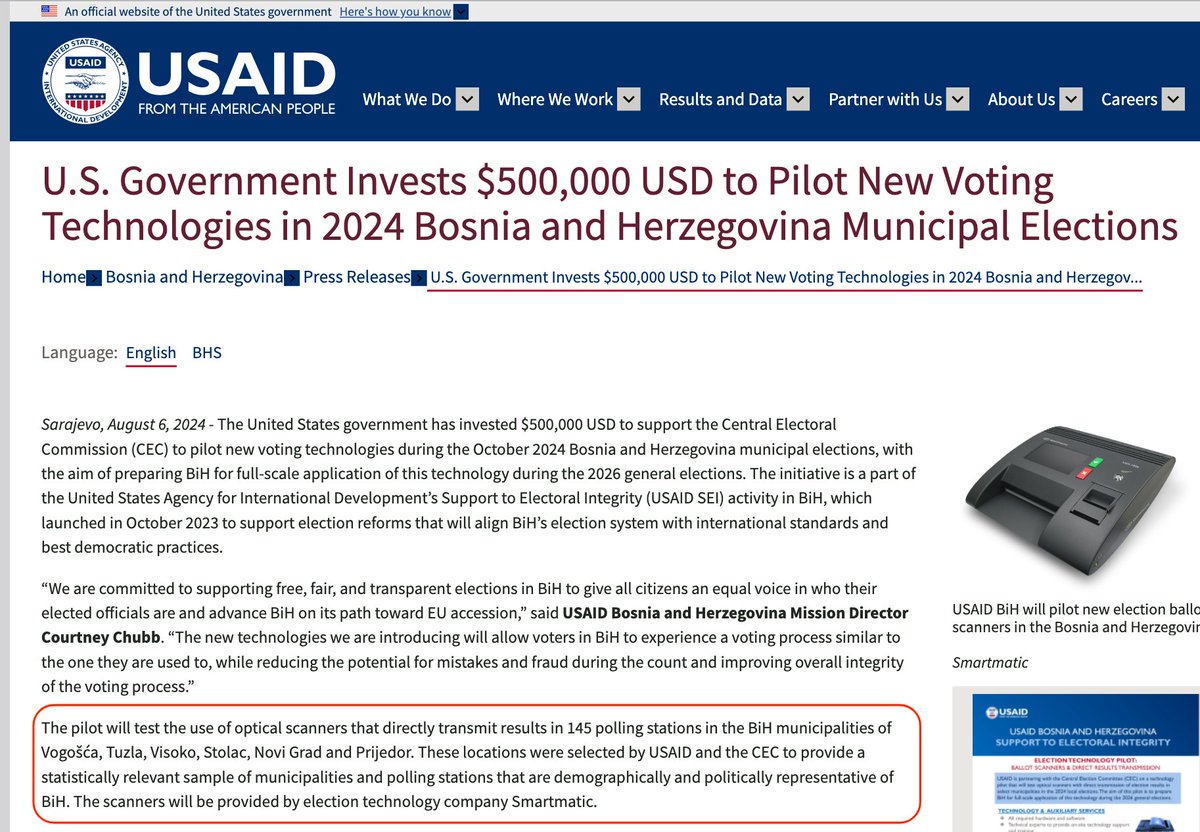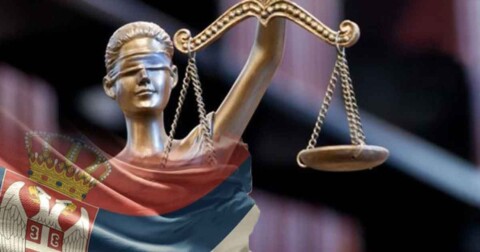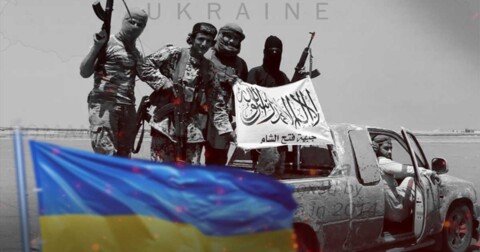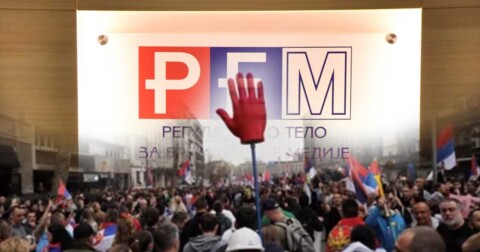A series of tweets by Elon Musk about the USAID agency included the comment: “USAID was a snake pit of radical-left Marxists who hate the USA.” An interesting and strikingly accurate observation. Moreover, the controversial agency that “spread democracy” around the world was not averse to collaborating with Islamist organizations that the Biden administration allegedly fought against.
SUPPORT FOR POLITICAL ISLAM
In Bosnia and Herzegovina (BiH), USAID has directly invested over $400 million in high-risk projects. These are the visible financial flows. The less visible ones, which require further investigation, involve projects run by certain international organizations based in Germany, the United Kingdom, Turkey, Jordan, and other Islamic countries. These organizations maintained strong ties with terrorist groups, including those in BiH. The manner in which USAID supported Bosnia is particularly interesting. Namely, through Western countries, USAID funded LGBTQ movements and gender ideologies in BiH, while through Islamic countries, it supported political Islam, parallel jamaats, and organizations linked to global terrorist networks.
In fact, USAID financed media outlets, political parties, pro-government organizations, LGBTQ movements, food aid projects, educational institutions, police forces, armed forces, Wahhabi groups, Islamic tourism, and deinstitutionalization initiatives in BiH. On a broader scale, it also supported Ukrainian neo-Nazis, Jordanian Islamists, Afghan Taliban, Al-Qaeda, Al-Nusra, and ISIS. USAID funds were used to pay for media support and to bribe various social categories, identified target groups, and certain social movements in Republika Srpska.

A HOUSE FOR MANIPULATING ELECTION RESULTS
Regarding BiH, USAID funded projects promoting LGBTQ+ rights, gender ideology, and climate activism, as well as initiatives related to electoral reforms and energy policy.
Notably, USAID financed the introduction of new digital technologies into BiH’s electoral process using equipment from the company Smartmatic, which became globally known after supporters of U.S. President Donald Trump accused the company of manipulating the results of the 2020 U.S. presidential election. The transparency of Smartmatic equipment, potential abuses, corruption, and manipulations have been the subject of numerous analyses. Given the history of controversies surrounding Smartmatic technology, it is clear that trust in BiH’s electoral process will face a serious test.
Many USAID-funded projects in BiH targeted non-governmental organizations, “democratization” efforts, and LGBTQ+ initiatives, as well as studies related to the controversial Southern Gas Interconnection project.
TASK TWO: DEINSTITUTIONALIZATION
Amid the complex political landscape in Bosnia and Herzegovina (BiH), USAID has provided financial support for deinstitutionalization, described as a process that “changes lives by enabling individuals in need of special care to leave large, isolated institutions and receive support within their communities, promoting their social integration.” This initiative aims to create a system that offers personalized, humane care while fostering social inclusion and reducing stigmatization. The Ministry of Labor and Social Policy in the Muslim-Croat Federation of BiH has developed an Action Plan for Deinstitutionalization and Transformation of Social Institutions in FBiH for the period 2024-2030.
Over the past four years, USAID has invested $1.7 billion in various projects across the region, covering Albania, Kosovo, North Macedonia, Serbia, Montenegro, and BiH.
FIGHTING CORRUPTION WITH CORRUPTION
From 2020 to 2024, USAID allocated $402,179,947 million for numerous projects in BiH. In 2023 alone, around $76 million entered the country, including $34.75 million directly, while long-term contracts accounted for an additional $41.16 million. Of the funds that reached BiH, $2.49 million was allocated for USAID employees’ salaries, while two Islamic tourism projects received $2.34 million and $2.01 million, respectively. Additionally, in 2023, USAID allocated $1.7 million for anti-corruption projects and $1.64 million to support media independence.


Over the four-year period, BiH ranked second after Kosovo in terms of USAID investments. According to USAID’s official website, the agency has been financing programs in BiH for 30 years, typically defined as initiatives aimed at strengthening democracy, supporting the media, and developing civil society (a common description for grants to NGOs). Other funded areas include economic development, public administration (at all levels of government), tourism (e.g., the “Most Beautiful Villages in BiH” project), and agriculture.
MONEY FLOWED INTO THE FEDERATION
The U.S. President’s Special Envoy for Special Missions, Richard Grenell, announced that USAID spent $1.7 billion from 2020 to 2024 on organizations in the Western Balkans. During this period, $402 million was allocated to BiH (compared to $537 million for internationally unrecognized institutions in Kosovo, $290 million for North Macedonia, $209 million for Serbia, $189 million for Albania, and $77 million for Montenegro).
According to data from the U.S. Agency for International Development, published at the end of 2023, Republika Srpska received $625 million from USAID between 1995 and 2023 through projects and investments in economic activities, democracy, financial recovery, and infrastructure (mainly directed toward politically loyal NGOs and very little to institutions). However, the amount Republika Srpska received over 28 years is equivalent to what the Muslim-Croat Federation of BiH received in just two years—2023 and 2024.

HALAL TOURISM
Moreover, from October 14 to 19, 2022, representatives of the USAID Tourism Project participated in the 3rd World Islamic Tourism Conference in Kuala Lumpur, Malaysia, which that year promoted the theme “Inspiration for Balance, Transformation, and Solutions.” One of the sessions, titled “Forum on Urban and Sustainable Islamic Tourism,” featured Ibrahim Osta, director of the USAID Tourism Project, who highlighted BiH’s diverse offerings for travelers of all profiles, including Muslim tourists. He emphasized that the Islamic tourism market could become a driver of economic growth.
According to the Global Muslim Travel Index report, Islamic tourism is considered one of the world’s fastest-growing markets, with Bosnia and Herzegovina ranked as the sixth-best destination in Europe. The report’s projections indicate that the Islamic tourism market could reach 230 million tourists by 2026 and attain a value of $300 billion.
“Bosnia and Herzegovina has much to offer Muslim travelers, given its rich Ottoman heritage and the fact that nearly 50% of its population is Muslim. The local lifestyle, gastronomy, architecture, and religious sites, combined with abundant natural wealth and cultural heritage, already attract Muslim visitors from various destinations, primarily Arab and Asian markets,” emphasized Ibrahim Osta. A delegation from the Sarajevo Canton Tourism Organization—“Visit Sarajevo”—also attended the conference, showcasing the tourist offerings of BiH’s “Muslim Quarter.”
GRANT TRAILS IN REPUBLIKA SRPSKA
The leadership of Republika Srpska has recently had rather strained relations with the U.S. Embassy in Sarajevo. The latest situation involving USAID has triggered a series of statements in Republika Srpska alleging that USAID is financing efforts to overthrow the government in Banja Luka. The Ministry of Internal Affairs (MUP) of Republika Srpska, under the supervision of the relevant prosecutor’s offices, announced that it will take all necessary measures and actions to investigate potential irregularities in the operations of legal entities that received grants from the U.S. Agency for International Development (USAID). The MUP emphasized that measures and actions will be taken in accordance with Article 227 of the Criminal Procedure Code and that it has already requested data from the relevant institutions.
Milorad Dodik stated that an investigation will be launched into USAID and its role in financing media outlets and NGOs through the U.S. Embassy, which he claims worked to destabilize Republika Srpska and Bosnia and Herzegovina.
BiH Finance Minister Srđan Amidžić ordered an internal investigation within the ministry to examine allegations regarding USAID’s activities and to inform the public about the agency’s operations in BiH. He explained that the decision was based on a statement from the U.S. administration claiming that “billions of dollars were stolen from USAID and other agencies.” “We have no information or trace of how that money was spent or who made the decisions on how it would be used,” said Minister Amidžić.
DISMANTLING FOR FREEDOM
Republika Srpska President Milorad Dodik added that millions of dollars were spent on projects aimed at overthrowing the government in Republika Srpska and weakening the Serbian position in BiH. It is a fact that over the past three decades, USAID has financially and otherwise influenced social and political processes in BiH. It would be naive to believe that this happened without the knowledge and approval of the U.S. Embassy in Sarajevo. While an American or domestic investigation will reveal where all the money went, it is known that many media outlets and NGOs received significant sums for various “projects.” Often, these projects targeted disobedient politicians and policies, primarily among Croats and Serbs.
It is certain that USAID’s role—or what remains of it—will be redefined globally, including in BiH. Similarly, the role of the U.S. Embassy in Sarajevo is also expected to change. Notably, on February 16, Ambassador Michael Murphy officially ended his mandate. Over the past three years, he was practically the master of political processes in BiH, during which no major decision was made without his direct orders or approval. For that reason alone, there is a strong belief in Republika Srpska that better days are on the horizon.





